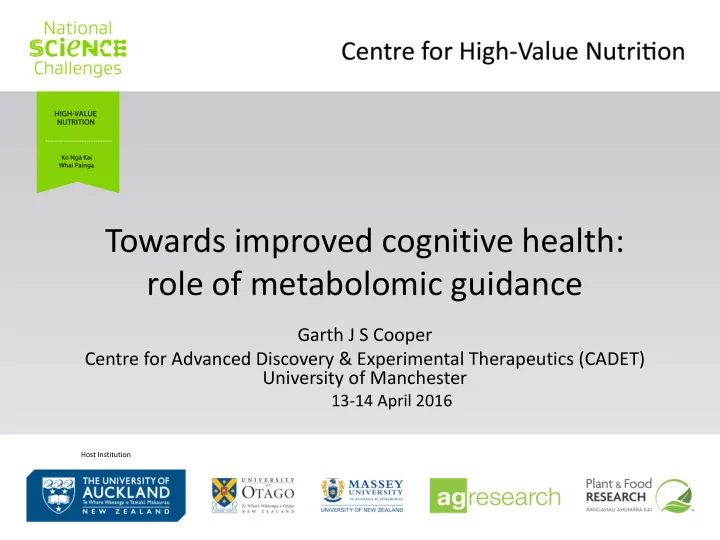

Towards improved cognitive health: role of metabolomic guidance Garth J S Cooper Centre for Advanced Discovery & Experimental Therapeutics (CADET) University of Manchester 13-14 April 2016 Host Institution
Approach Metabolites Metabolomics • Small metabolites • Gas-chromatography mass- • Mass: 70 Da~300 Da spectrometry (GC-MS) • N = ~50-90 • Liquid-chromatography mass- • Structural Lipids etc spectrometry (LC-MS) • Mass: ~100-700 Da • N ~600-1000 Proteomics (enzymes, transporters, Proteins (from peptide digests) structural proteins, etc.) • Hundreds to several • Protein mass spectrometry thousands
Representative GC-MS metabolomic profile of human brain (entorhinal cortex) Xu J…Cooper GJS Biochim Biophys Acta, 2016
Background Metabolomics-based characterisation of complex metabolic states
Prediction of a complex metabolic disorder by metabolomic analysis of plasma Method now under development for entry into multi-centre trials in the UK Yellow, preeclampsia; blue, control for application in routine pregnancy screening
Plasma metabolomics identifies multiple defects in lipid regulation that occur prior to defective glucose regulation in diabetes
Brain metabolomics Discovery of defects in common metabolic pathways as the probable cause of dementia in Alzheimer’s disease and Huntington’s disease: windows on cognitive health
Proteomics-based discovery of diabetes-like metabolic defects in Alzheimer’s brain
…and in Huntington’s brain
Metabolomic analysis of human brain identifies toxigenic urea levels as a probable cause of neurodegeneration in Huntington’s
Global GC-MS metabolomics identifies toxigenic elevations of glucose and polyol pathway intermediates in the putamen of Huntington’s brain Note that the putamen is the region where Patassini S…Cooper GJS 2016, in the neurodegeneration is thought to begin in HD brain press
Severe elevation of polyol pathway metabolites in Alzheimer’s brain are at toxigenic levels Human Alzheimer’s brain Metabolomic analysis of the peripheral nervous system in the diabetic rat Freeman OJ…Cooper GJS, Gardiner N Xu J…Cooper GJS Biochim Biophys Acta , Diabetes , 2016 2016
Conclusions • Metabolomic analysis of plasma can be used to predict onset and monitor progression of complex metabolic disorders • Common causes of dementia display toxigenic levels of well known metabolites in brain regions known to undergo neurodegeneration in cognitive impairment • These recently identified defects provide the probable cause of neurodegeneration and dementia in Alzheimer’s disease and Huntington’s disease • Relatively small delays in onset and progression may convey major benefit at the population level • The pathways implicated in cognitive impairment by metabolomic analysis are well known to be amenable to nutritional/life-style modification and could serve as targets for focussed nutritional interventions aimed at improving cognitive health • Development of nutritional interventions to address these recently discovered mechanisms is encouraged
Recommend
More recommend